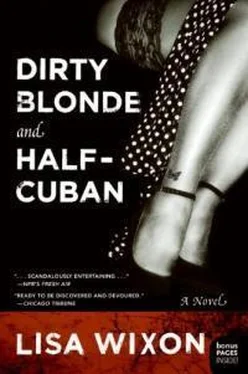Lisa Wixon - Dirty Blonde and Half-Cuban
Здесь есть возможность читать онлайн «Lisa Wixon - Dirty Blonde and Half-Cuban» весь текст электронной книги совершенно бесплатно (целиком полную версию без сокращений). В некоторых случаях можно слушать аудио, скачать через торрент в формате fb2 и присутствует краткое содержание. Жанр: Современная проза, на английском языке. Описание произведения, (предисловие) а так же отзывы посетителей доступны на портале библиотеки ЛибКат.
- Название:Dirty Blonde and Half-Cuban
- Автор:
- Жанр:
- Год:неизвестен
- ISBN:нет данных
- Рейтинг книги:4 / 5. Голосов: 1
-
Избранное:Добавить в избранное
- Отзывы:
-
Ваша оценка:
- 80
- 1
- 2
- 3
- 4
- 5
Dirty Blonde and Half-Cuban: краткое содержание, описание и аннотация
Предлагаем к чтению аннотацию, описание, краткое содержание или предисловие (зависит от того, что написал сам автор книги «Dirty Blonde and Half-Cuban»). Если вы не нашли необходимую информацию о книге — напишите в комментариях, мы постараемся отыскать её.
Dirty Blonde and Half-Cuban — читать онлайн бесплатно полную книгу (весь текст) целиком
Ниже представлен текст книги, разбитый по страницам. Система сохранения места последней прочитанной страницы, позволяет с удобством читать онлайн бесплатно книгу «Dirty Blonde and Half-Cuban», без необходимости каждый раз заново искать на чём Вы остановились. Поставьте закладку, и сможете в любой момент перейти на страницу, на которой закончили чтение.
Интервал:
Закладка:
“ Mira,Alysia, it’s a big decision,” Rafael says, feigning indifference. “Don’t you want to spend time with your father after all that’s happened to find him? If you stay, he’ll take care of you, verdad?”
“He’s offered. But I’m not sure I’ll last very long being taken care of by anyone. Besides, he’s not a rich man.”
Rafael toys with the shrimp on his plate. That I’m to leave Cuba soon hangs in the air and kills a merriment we normally share.
“I feel something very strong for you, mi vida,” Rafael says. He folds his arms on the table and looks away, as if transfixed by a point on the distant horizon. “All my Cuban girlfriends in the past have understood that my business with tourists is my business. If I’m gone a night or two or a week, I have to have that freedom. Dios mío,I don’t wantto go out hustling. But I’m the head of my family. I have my mother and brothers to look after.”
On reflex, I reach out and touch Rafael’s cheek with the back of my fingers, feeling the smoothness of his skin against mine. A rare sensation gnaws at me, one I can’t quite place. Then I recognize the emotion: jealousy. I’m imagining the foreign girls who pine for him, and the cubanassuch as Modesta who can’t get over him. I’m jealous, awfully jealous. All my life I swore to myself I’d avoid the emotion, that it’s not sensible or ladylike, and certainly not in the Briggs family lexicon. But the creeping presence of jealousy, this celosía,signals a deepening of my cubanidad.The environment is stronger than me, and is altering my beliefs.
Rafael waits expectantly for a reply. For the first time, I consider the possibilities. Could I actually live in Cuba? Would I manage to thrive among the jinete,as surely my occupation would remain? And as a jinetera,could I be the girlfriend of a jineteroand all that it entails?
Truth is, my mother didn’t want to leave José Antonio Vilar of Calle M, and I don’t, either. My mother regretted leaving her Cuban love, and I don’t want to regret leaving mine. Could my mother in her afterlife be nudging me to live my life differently? To damn convention and rational thought and go with the basic instincts we’re provided to see us through?
“Some days,” Rafael says, “I have to spend six hours to find one lightbulb, m’entiendes? Tomorrow, I have to go to the barrioand buy three or four ounces of cocaine for some tourists in Havana Vieja, and then I need to use my profit to repair the roof on our home. Next week, a group of Italians I know are coming back to town and will want teenage jineteras.Do you see? No es fácil.You, all you’ve done is put a flower behind your ear and pretend to be cubanafor a year. You’ve scammed some handsome tourists, you’ve gotten some presents. But the real vida,Alysia, the way things really work here is forever luchando.I want you to stay. Dios mío,I want you to stay. But I don’t know if you can deal with Cuba, not when it’s permanente.”
“Maybe you’re right,” I say, also pushing my plate aside. I think not just about my father, but also about my aging abuela,spry and funny in her housedresses and clip-on earrings, and her daily José Martí recitations and French-language endeavors. How long will she be alive so that I may know her? What about Camila and Daya and the people whom I’ve come to love in their support of a Yankee stranger? If I leave Cuba, I’m leaving more than frustratingly long lines and a life of jineterismo.
I’m leaving behind my own dream.
I’ve seen my mother’s body attack itself in her sorrow, in her not following her heart and staying with José Antonio. I saw John, in my early childhood, become the man he dreamed of being and, when he lost my mother, bury himself in the refuge of what was familiar, in the politically showcased family that placed little premium on love.
If I stay, I think, I’ll continue missing the fragments that made up my comfortable life. I miss my platinum American Express card, which sits unused in my wallet, and also my bank accounts, as these have once been relied upon to provide a well-being and safety that comes from having access to money. I miss the doorman at the Watergate, a room of my own, and the feel of fresh, clean towels tumbled dry in a machine—unlike the stiff, sun-baked cotton that passes for bath gear here. I miss my indulgences, the face creams and department store cosmetics and shampoos, and the certainty that the lights will be on to apply them. I miss America and twenty-four-hour pharmacies. I miss sashimi and TiVo and world news. But these, of course, are small things.
To stay in Cuba would be to suffer considerable losses. There is John, who, despite our fallout, retains a place in my heart. And there is Susie, and my other friends. How many of their weddings and new jobs and babies will I not be there to celebrate? And what of my own?
John always told me that, when making a decision, it’s best to write down the pros and cons in two columns, and measure them up, side by side. But that isn’t helping me here. For every minus, there’s a corresponding plus, and for every bounty reaped there’s a deficit. As I parse down the good and the bad, I realize I’m angry. What kind of world is this? We’re a mere ninety miles away from the U.S., and though it’s a lonely path across mean seas, I’m irritated that forty-five years have gone by and no bridge has been built to close the chasm. The divide is temporal and spatial, and the distance so great I feel like I might as well be on the moon.
“When you do go back,” says Rafael sadly, “don’t ask me to exchange addresses. I can’t do that. Not with you.”
I sigh. The only thing I am certain about right now is that I’m ready to go home with Rafael tonight and feel what it’s like to slip between his sheets. I need a vacation from the inside of my brain, and to attend to the other parts of my body that are ignited. This urge for him is overwhelming and I convey it none too subtly. But when we arrive at my home, Rafael’s lips barely scrape my cheek, and he drops me at the road, refusing to come in. Standing at my doorstep in a cloud of pollution, his Chevy zooming away, I feel rejected and even more confused.
A few hours later, he phones.
“If you were a tourist,” Rafael says, “there’d be no way I’d have turned you down tonight. I wouldn’t care about you, I’d just be scamming. Escúchame,but I can’t sleep with you—you’re going to leave. I do nothave a passport. I can notcome after you. I am trapped in Cuba. What kind of man wants to know he cannot pursue the woman he loves?”
65
T ears are flowingoutside the house at Calle M. It’s still dark, and my plane leaves in a few hours and I’m trying to keep it together while I say good-bye to Camila and Daya and the aunts and uncles and cousins whose distinctions I barely recall.
That my entire extended family has arrived to see me off so early in the morning is overwhelming.
Whispering in Daya’s ear, I hand her a sack with the jar of peanut butter and strict instructions to give Limón the gag gift if ever he’s released, although whatever humor it once held seems to have deflated now. Daya’s thumb is in her mouth, and she kicks at a few pebbles with a dancer’s pointed toe. My grandmother pushes up the thick glasses on her nose and starts to cry. She can’t believe her granddaughter is yet again leaving pa’ la Yuma.
“Tell Rafael…” I whisper in Camila’s ear. “Tell him I understand why he didn’t say good-bye.”
Camila nods and throws her arms around me. “Alysia… Ya tú sabes.”
Any second I’ll start sobbing, and so I hand Tito to my grandmother and climb inside the taxi. My father settles next to me and I’m grateful he’s saving his farewell for my departure at José Martí International. I need to say good-bye in stages.
Читать дальшеИнтервал:
Закладка:
Похожие книги на «Dirty Blonde and Half-Cuban»
Представляем Вашему вниманию похожие книги на «Dirty Blonde and Half-Cuban» списком для выбора. Мы отобрали схожую по названию и смыслу литературу в надежде предоставить читателям больше вариантов отыскать новые, интересные, ещё непрочитанные произведения.
Обсуждение, отзывы о книге «Dirty Blonde and Half-Cuban» и просто собственные мнения читателей. Оставьте ваши комментарии, напишите, что Вы думаете о произведении, его смысле или главных героях. Укажите что конкретно понравилось, а что нет, и почему Вы так считаете.












